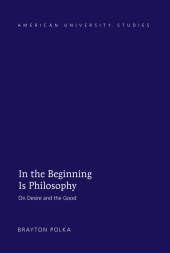 Neuerscheinungen 2016Stand: 2020-02-01 |
Schnellsuche
ISBN/Stichwort/Autor
|
Herderstraße 10
10625 Berlin
Tel.: 030 315 714 16
Fax 030 315 714 14
info@buchspektrum.de |

Brayton Polka
In the Beginning Is Philosophy
On Desire and the Good
Neuausg. 2016. VIII, 276 S. 225 mm
Verlag/Jahr: PETER LANG, PIETERLEN 2016
ISBN: 1-433-13368-7 (1433133687)
Neue ISBN: 978-1-433-13368-8 (9781433133688)
Preis und Lieferzeit: Bitte klicken
This book would be indispensable to courses (both undergraduate and graduate) in philosophy, religious studies, and the history of ideas - in interdisciplinary courses in the humanities, generally - that focus on the values that are central, both historically and ontologically, to modernity.
Philosophy, when understood to embody the values that are fundamental to modernity, is biblical in origin, both historically and ontologically. Central to this idea is the question famously posed by Tertullian: What does Athens have to do with Jerusalem? The answer - as based on a comprehensive and systematic discussion of the key texts and ideas of Spinoza, Vico, Rousseau, Kant, Hegel, Kierkegaard, and Nietzsche - is that we can overcome the conventional opposition between reason and faith, between philosophy and theology, and between the secular and the religious only if we learn to see that, as Spinoza shows us, both philosophy (reason) and theology (faith) are based on caritas : love - on the divine command to do unto others what you want others to do unto you. Provided throughout is a commentary on how fundamentally different philosophy is in the Greek and in the biblical traditions (in Athens and in Jerusalem). Whereas Socrates argues that (human) desire and the (divine) good are contradictory opposites, Spinoza shows that it is human desire that truly constitutes the divine good of all.
This book would be indispensable to courses (both undergraduate and graduate) in philosophy, religious studies, and the history of ideas - in interdisciplinary courses in the humanities, generally - that focus on the values that are central, both historically and ontologically, to modernity.
Contents: In Beginning with Adam and Eve as the Story of Two Beginnings - in Athens and Jerusalem - History: What Do I Believe? In Beginning with History as Faith in the Absolute - Ontology: What Do I Think? In Beginning with God as Necessary Existence - Ethics: What Do I Love? In Beginning with the Neighbor as My Creation - Hermeneutics: What Do I Interpret? In Beginning with the Other as the Truth of Myself - Politics: What Do I Will? In Beginning with Relationship as the Freedom and Equality of All - Conclusion: In Ending with Philosophy as Beginning with the Good of Desire.
Brayton Polka is Professor Emeritus of Humanities and Senior Scholar at York University in Toronto. He is the author of a number of books and many smaller studies in which he examines the emergence, in the early modern period, of the values that constitute modernity and their development through the nineteenth and into the twentieth centuries. Focusing on the issue of hermeneutics - of what it means to interpret a text - this books include studies of Shakespeare, Spinoza, Kant, Hegel, Kierkegaard, Schopenhauer, Wagner (his operas), Nietzsche, and Freud.


